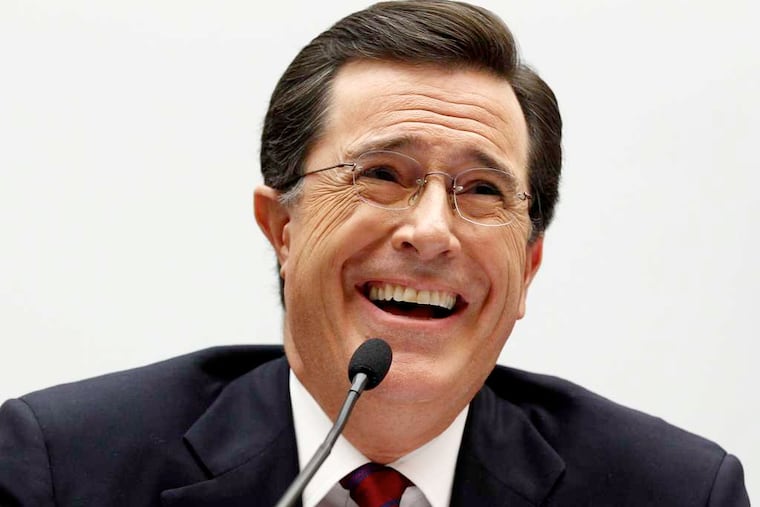Penn study: Colbert's civics lesson 'not just a proliferation of jokes'

Is there a subject duller than campaign finance?
How do you take an impenetrable but important topic and turn it into a story that everyone can understand?
Give it to Stephen Colbert.
Don't scoff. There's now a study that proves it.
Leading up to the last presidential election, the faux conservative host of The Colbert Report created a super PAC and a secretive "dark money" group on his show.
Viewers who saw those satirical Colbert segments were significantly better informed about the role of money in politics than viewers of any other news show or news channels, according to the Annenberg Public Policy Center at the University of Pennsylvania. Its study, called "Stephen Colbert's Civics Lesson," was published online today in the journal Mass Communication and Society.
The parody bits were prompted by the Supreme Court's Citizens United ruling, which equated spending money with free speech. The ruling allows corporations and unions to spend as much as they want to influence the results of elections.
Colbert's super PAC, the ridiculously named "Americans for a Better Tomorrow, Tomorrow," was created on air with the help of the former chairman of the Federal Election Commission, Trevor Potter, who provided extensive on-air legal advice with a broad smile.
Set up to accept unlimited corporate donations, the super PAC was then folded into a 501(c)4, which effectively hides the identities of the donors.
"Clearly, (c)4s have created an unprecedented, unaccountable, untraceable cash tsunami that will infect every corner of the next election. And I feel like an idiot for not having one," Colbert cracked during the show.
According to the study, Colbert's satire served as "an extended civics lesson" that had a greater effect than "reading a daily newspaper, listening to talk radio, and watching Fox News."
The ongoing parody won Colbert a prestigious Peabody Award in 2012.
Said Colbert at the time: "What an honor! I am truly speechless. Luckily, thanks to Citizens United, my money can speak for me."
The results of the Annenberg study surprised researchers.
Previous studies had found that viewers of The Colbert Report and The Daily Show have higher levels of political knowledge, said lead researcher Bruce W. Hardy.
Not only did the show increase people's perceptions that they knew more about political financing, but it significantly increased their actual knowledge and did so at a greater rate than other news sources, he said.
"We were expecting to find significant relationships," Hardy said. "We weren't expecting something of that magnitude."
How did Colbert do it?
"He walked us through creating a super PAC and every episode was a continuation of that story," Hardy said. "And the second was the use of humor and satire."
The study, which concluded that "Colbert's efforts were educational, not just a proliferation of jokes," spotlighted one of comedian's exchanges with Potter:
Colbert: So I could get money from my (c)(4), use that for political purposes,
and nobody knows anything about it until 6 months after the election?
Potter: That's right. And even then they won't know who your donors are.
Colbert: That's my kind of campaign-finance restriction . . . OK, so now I
can get corporate and individual donations of unlimited amounts
for my (c)(4). What can I do with that money?
Potter: Well, that (c)(4) could take out political ads and attack candidates or
promote your favorite ones as long as it's not the principle purpose
for spending its money.
Colbert: No, my principle purpose is an educational entity, right? I want to
educate the public that gay people cause earthquakes. OK?
Potter: There are probably some (c)(4)s doing that.
Colbert: Can I take this (c)(4) money and then donate it to my super PAC?
Potter: You can.
Colbert: But wait, wait, super PACs are transparent.
Potter: Right . . .
Colbert: And the (c)(4) is secret.
Potter: Hmm.
Colbert: So I can take secret donations of my (c)(4) and give it to my supposedly
transparent super PAC.
Potter: And it'll say, 'Given by your (c)(4).'
Colbert: What is the difference between that and money laundering?
Potter: It's hard to say.
As delighted as Hardy is with the results, he's careful not to jump to conclusions. Colbert can't be your one-stop shop for civic enlightenment, his methods aren't appropriate for non-faux news. And besides, he's been tapped to replaced David Letterman on CBS, likely meaning less of his mock-politics shtick.
"This is a very specific case study. It's Colbert getting into the process himself," Hardy said. "Do we want other news sources to get into the process like that? I don't think that would be a good idea."